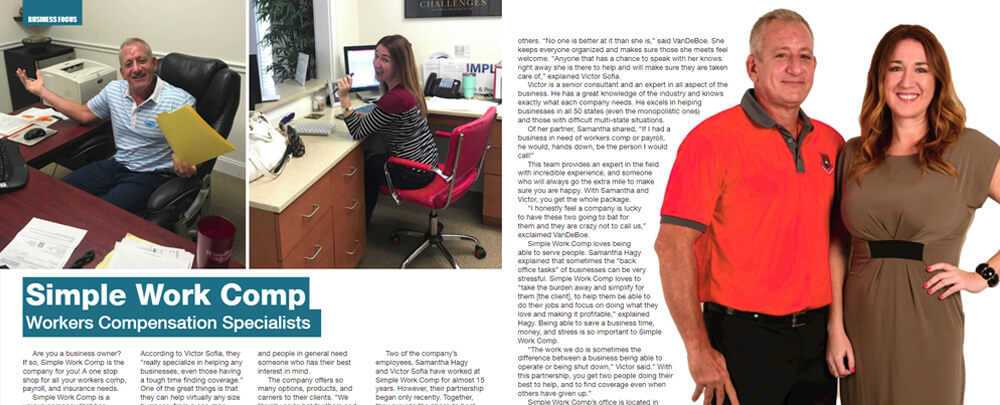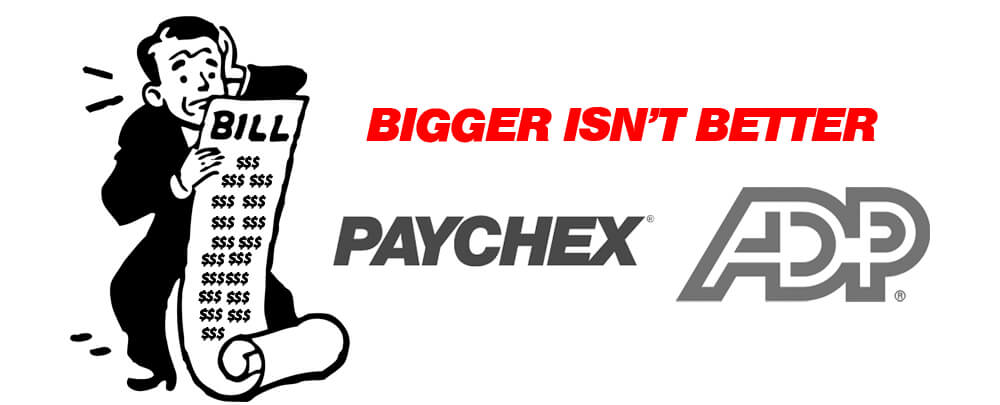Focus Magazine: Simple Work Comp is a one stop shop for all your workers comp, payroll, and insurance needs.
Earlier this year Focus Magazine wrote an article featuring Simple Work Comp’s Victor Sofia and Samantha Hagy. The article highlights Simple Work Comp’s unique approach to helping businesses find affordable workers’ comp, payroll solutions, insurance, and more. Simple Work Comp: The Work Comp Specialist
BIGGER ISN’T ALWAYS BETTER – At Simple Work Comp we’re not trying to be the biggest; we’re trying to provide the best services.
The popular ideologies “bigger is better” and “size matters” are how society measures ‘popularity’ but not necessarily ‘quality,’ especially when it comes to hiring someone to run important departments within a business. Two of the most recognized human resource management software and service companies
State: MN Report Says Paid Comp Claims Down 43% from 1997 to 2010:
The number of paid workers’ compensation claims fell 43% relative to the number of employees from 1997 to 2010, the 2010 “Minnesota Workers’ Compensation System Report” released Tuesday by the Minnesota Department of Labor and Industry shows. The report says the workers’ compensation claim
State: CA Owners of Construction Company Charged with Fraud:
The San Bernardino County District Attorney’s Office filed fraud charges against the owners of a Southern California construction company for allegedly underreporting payroll to their workers’ compensation carrier. The District Attorney’s Office charged Gary Renshaw, 50, his wife Tammy Renshaw, 50, and their daughter
State: PA SWIF Probe: Auditor was on Staffing Firms' Payroll for Decade:
By Michael Whiteley, Eastern Bureau Chief An auditing supervisor for the State Workers’ Insurance Fund (SWIF) was on the payroll of three Pennsylvania staffing companies for at least a decade before he was arrested on bribery charges Monday by a special investigations unit of
State: FL Contractor Charged in Shell Company Case:
The president of a West Florida construction company was arrested last week on charges of falsifying payroll information to reduce workers’ compensation premiums paid to Guarantee Insurance Co. and illegally using a “shell company.” Florida Chief Financial Officer Jeff Atwater said Friday that Randall
CFO Atwater Announces Conviction of Jacksonville Man in Elaborate Workers’ Comp Fraud Scheme, Illegal Check Cashing Operation
TALLAHASSEE – Florida Chief Financial Officer Jeff Atwater announced today the conviction of aJacksonville man in an elaborate workers’ compensation fraud scheme. David Rodriguez Socarras appeared before the Fourth Judicial Circuit Court Monday and pled guilty to five charges, including application fraud and workers’
How can I tell if my small business is exempt from state compensation laws?
Each state has its own laws and regulations that control the workers compensation program in their state, and these laws vary from state to state. In most cases, if you are an employer with at least one employee, you are required to carry workers
How Create a Compensation Plan
Creating a compensation package is not as simple as adding salary with benefits. There are many important factors to consider: If you offer incentives and/or bonus plans, you need to have very clear guidelines to minimize confusion and possible liability issues. These should not
Outsourcing Payroll
Many small business or practice owners with employees decide to outsource payroll and related tax duties to third party payroll service providers. This helps employers meet filing deadlines and deposit requirements and streamline business operations. Some of the services provided include administering payroll and


